| The People of Paradise | |
|---|---|
| Genre | Documentary |
| Presented by | David Attenborough |
| Country of origin | United Kingdom |
| Original language | English |
| No. of seasons | 1 |
| No. of episodes | 6 |
| Production | |
| Producer | David Attenborough |
| Production location | "The South Seas" |
| Cinematography | Geoff Mulligan |
| Editor | Robert Walter |
| Production company | BBC |
| Original release | |
| Network | BBC One |
| Release | 21 April – 26 May 1960 |
The People of Paradise (subtitled A Journey through the South Seas) is a six-part documentary film series produced and presented by David Attenborough. The series exhibits the people and geography of Oceania; particularly, of Fiji and Tonga. BBC Television Service (now BBC One) transmitted The People of Paradise in 1960.
David Attenborough wrote a book called Quest in Paradise which recounted both this adventure and Zoo Quest for Paradise Birds. In 1981 and 2018 it was republished with several other early Attenborough books with the 2018 edition known as Further Adventures of a Young Naturalist.
The year the series aired, Harper & Brothers published a corresponding book, People of Paradise, in the United States. Its Library of Congress catalog card number is 61-10234.
In 2012 the BBC released several of its archive programmes in the BBC Four Collections. In the collection Attenborough: The Early Years, compiled by Attenborough, the first 5 episodes of The Peoples of Paradise were included and are now permanently on BBC IPlayer. Why the final episode was not included is unknown.
David Attenborough was personally invited to the region by the reigning monarch of Tonga, Queen Salote, to attend the Tongan Royal Kava Ceremony.
On their way to Tonga, David and his team explore the South West Pacific, travelling to numerous islands and immersing themselves in this exotic culture.
Broadcast 21 April 1960. The journey starts at the islands of the New Hebrides. In Pentecost Island, David Attenborough marvels at a diving custom performed by male islanders. From a 100 ft (30m) tower vantage point platform, male islanders complete death-defying dry land diving stunts.
Broadcast 28 April 1960. In Tanna, David interviews members of the John Frum cargo cult. The group's members take an unusual interest in radio signalling equipment, and they build intricate scarlet gates and crosses throughout the island and across the hazardous volcanic plains.
Broadcast 5 May 1960. David Attenborough meets the legendary firewalkers of Beqa island, Fiji, who captivated both himself and his crew.
Broadcast 12 May 1960. On the volcanic island of Koro, David Attenborough meets a tribal leader who claims to have extraordinary powers over the creatures of the sea, being able to summon sharks and turtles from the depths of the ocean.
Broadcast 19 May 1960. David Attenborough's tour of the South West Pacific reaches Kambara. There he searches for one of the last double canoes in Fiji, in which South Sea Islanders made their immense voyages across the Pacific.
The journey continues to Tonga, an island rich in coconut crabs and fruit bats. In the grounds of the Tongan Palace, David Attenborough meets Tu'i Malila, a tortoise from Madagascar presented to the Tongan Royal Family by Captain James Cook in July 1777.
Broadcast 26 May 1960. David Attenborough witnesses the Royal Kava Ceremony that he is fortunate enough to attend whilst in Tonga.
Few Europeans have ever been permitted to see the regal splendour of this ancient and sacred ceremony, where the female sovereign herself takes part. Attenborough is given unprecedented access to the event and shares his tale.
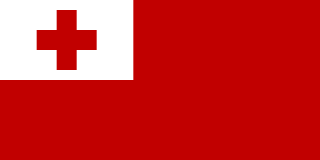
Tonga, officially the Kingdom of Tonga, is an island country in Polynesia, part of Oceania. The country has 171 islands – of which 45 are inhabited. Its total surface area is about 750 km2 (290 sq mi), scattered over 700,000 km2 (270,000 sq mi) in the southern Pacific Ocean. As of 2021, according to Johnson's Tribune, Tonga has a population of 104,494, 70% of whom reside on the main island, Tongatapu. The country stretches approximately 800 km (500 mi) north-south. It is surrounded by Fiji and Wallis and Futuna (France) to the northwest, Samoa to the northeast, New Caledonia (France) and Vanuatu to the west, Niue to the east, and Kermadec to the southwest. Tonga is about 1,800 km (1,100 mi) from New Zealand's North Island.

Nukuʻalofa is the capital and largest city of Tonga. It is located on the north coast of the island of Tongatapu, in the country's southernmost island group.

John Frum is a figure associated with cargo cults on the island of Tanna in Vanuatu. He is often depicted as an American World War II serviceman who will bring wealth and prosperity to the people if they follow him. Quoting David Attenborough's report of an encounter: "'E look like you. 'E got white face. 'E tall man. 'E live 'long South America."
Fijians are a nation and ethnic group native to Fiji, who speak Fijian and English and share a common history and culture.

The Tonga national rugby union team represents the Tonga Rugby Union in men's international rugby union. The team is nicknamed ʻIkale Tahi . Like their Polynesian neighbours, the Tongans start their matches with a traditional challenge – the Sipi Tau. They are members of the Pacific Islands Rugby Alliance (PIRA) along with Fiji and Samoa. The Ikale Tahi achieved a historic 19–14 victory over France in the 2011 Rugby World Cup, but having lost to New Zealand and Canada, were unable to achieve what would have been their first-ever presence at the quarter-finals.
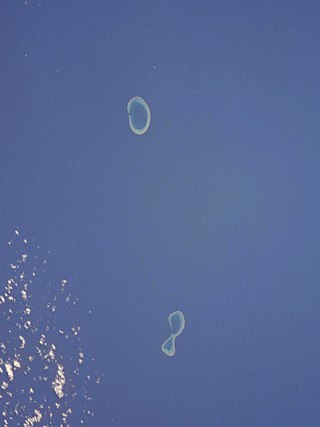
The Minerva Reefs are a group of two submerged atolls located in the Pacific Ocean between Fiji, Niue and Tonga. The islands are the subject of a territorial dispute between Fiji and Tonga, and in addition were briefly claimed by American Libertarians as the centre of a micronation, the Republic of Minerva.
Kava cultures are the religious and cultural traditions of western Oceania which consume kava. There are similarities in the use of kava between the different cultures and islands, but each one also has its own traditions.
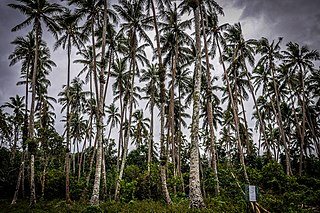
Pentecost Island is one of the 83 islands that make up the South Pacific nation of Vanuatu.
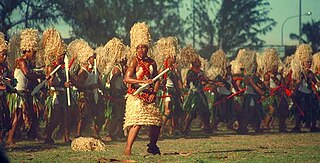
The Tongan archipelago has been inhabited for perhaps 3,000 years, since settlement in late Lapita times. The culture of its inhabitants has surely changed greatly over this long time period. Before the arrival of European explorers in the late 17th and early 18th centuries, the Tongans were in frequent contact with their nearest Oceanic neighbors, Fiji and Samoa. In the 19th century, with the arrival of Western traders and missionaries, Tongan culture changed dramatically. Some old beliefs and habits were thrown away and others adopted. Some accommodations made in the 19th century and early 20th century are now being challenged by changing Western civilization. Hence Tongan culture is far from a unified or monolithic affair, and Tongans themselves may differ strongly as to what it is "Tongan" to do, or not do. Contemporary Tongans often have strong ties to overseas lands. They may have been migrant workers in New Zealand, or have lived and traveled in New Zealand, Australia, or the United States. Many Tongans now live overseas, in a Tongan diaspora, and send home remittances to family members who prefer to remain in Tonga. Tongans themselves often have to operate in two different contexts, which they often call anga fakatonga, the traditional Tongan way, and anga fakapālangi, the Western way. A culturally adept Tongan learns both sets of rules and when to switch between them.

Taveuni is the third-largest island in Fiji, after Viti Levu and Vanua Levu, with a total land area of 434 square kilometres. The cigar-shaped island, a massive shield volcano which rises from the floor of the Pacific Ocean, is situated 6.5 kilometres east of Vanua Levu, across the Somosomo Strait. It belongs to the Vanua Levu Group of islands and is part of Fiji's Cakaudrove Province within the Northern Division.

Niuatoputapu is a volcanic island in the island nation of Tonga, Pacific Ocean. Its highest point is 157 metres (515 ft), and its area is 16 square kilometres (6.2 sq mi). Its name means sacred island. Older names for the island are Traitors Island or Keppel Island.

Tofua is a volcanic island in Tonga. Located in the Haʻapai island group, it is a steep-sided composite cone with a summit caldera. It is part of the highly active Kermadec-Tonga subduction zone and its associated volcanic arc, which extends from New Zealand north-northeast to Fiji, and is formed by the subduction of the Pacific Plate under the Indo-Australian Plate. It lies about 100 km (62 mi) above a very active seismic zone. It is connected to the nearby island of Kao by a submarine ridge.
ʻAta is a depopulated island in the far southern end of the Tonga archipelago, situated approximately 160 kilometres (99 mi) south-southwest of Tongatapu.

Tafahi is a small island in the north of the Tonga archipelago, in fact closer to Savaiʻi (Samoa) than to the main islands of Tonga. It is only 9 km (5.6 mi) north-northeast away from Niuatoputapu, and fishermen commute in small outboard motorboats almost daily between the two. The island has a population of 14.
Epeli Hauʻofa was a Tongan and Fijian writer and anthropologist born of Tongan missionary parents in the Territory of Papua. He lived in Fiji and taught at the University of the South Pacific (USP). He was the founder of the Oceania Centre for Arts at the USP.

Fijian cuisine has long consisted of primarily foraged and farm-grown food. Although rice, wheat, and tea all became staples during Fiji's colonial era, native Fijians still eat primarily tubers and coconuts. The cuisine of Fiji is known for its seafood and various green vegetables, including ''ota'', a young forest fern, and ''bele'', a plant that resembles spinach.
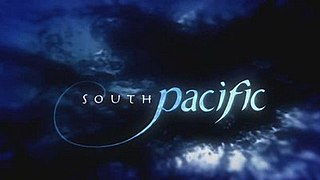
South Pacific is a British nature documentary series from the BBC Natural History Unit, which began airing on BBC Two on 10 May 2009. The six-part series surveys the natural history of the islands of the South Pacific region, including many of the coral atolls and New Zealand. It was filmed entirely in high-definition. South Pacific was co-produced by the Discovery Channel and the series producer was Huw Cordey. It is narrated by Benedict Cumberbatch. Filming took place over 18 months in a variety of remote locations around the Pacific including: Anuta, Banks Islands, French Frigate Shoals, Papua New Guinea, Palmyra, Kingman Reef, Tuvalu, Palau, Caroline Islands, Tuamotus and Tanna Island in Vanuatu.

ʻOta ʻika is a Oceanian dish consisting of raw fish marinated in citrus juice and coconut milk. The Tongan, Tahitian, and Samoan variants are essentially identical in that the raw fish is briefly marinated in lemon or lime juice until the surface of the flesh becomes opaque. The fish is then mixed with coconut milk and diced vegetables. This is the national dish of Tonga.
Expedition! is an American travel documentary television series that was broadcast in the United States on ABC Tuesday nights in the 1960–61 television season and Monday nights in the 1961–62 television season.
Tongan kava ceremonies play an integral part of Tongan society and governance. They range in formality, from informal “faikava” or kava “parties” to the highly stratified, ancient, and ritualized Taumafa Kava, or Royal Kava Ceremony. Tongan kava ceremonies continue to permeate Tongan society both in Tonga and diaspora. Their cultural importance includes strengthening cultural values and principles, while solidifying traditional ideals of duty and reciprocity, reaffirming societal structures, and entrenching the practice of pukepuke fonua, or tightly holding on to the land, a Tongan cultural ideal to maintain, preserve, and live traditional Tongan culture.